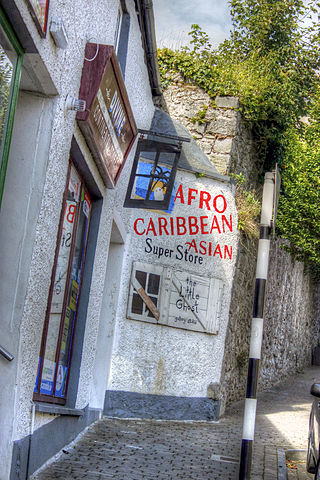Related Research Articles

Oliver Cromwell was a politician and soldier, widely regarded as one of the most important statesmen in English history. He came to prominence during the 1639 to 1653 Wars of the Three Kingdoms, first as a senior commander in the Parliamentarian army and then as a politician. A leading advocate of the execution of Charles I in January 1649, which led to the establishment of The Protectorate, he ruled as Lord Protector from December 1653 until his death in September 1658. Cromwell nevertheless remains a controversial figure in both Britain and Ireland, due to his use of the military to first acquire, then retain political power, and the brutality of his 1649 Irish campaign.

1649 (MDCXLIX) was a common year starting on Friday of the Gregorian calendar and a common year starting on Monday of the Julian calendar, the 1649th year of the Common Era (CE) and Anno Domini (AD) designations, the 649th year of the 2nd millennium, the 49th year of the 17th century, and the 10th and last year of the 1640s decade. As of the start of 1649, the Gregorian calendar was 10 days ahead of the Julian calendar, which remained in localized use until 1923.

Monarchical systems of government have existed in Ireland from ancient times. In the south this continued until the early twentieth century, when it transitioned to the Republic of Ireland. Northern Ireland, as part of the United Kingdom, remains under a monarchical system of government.

The Irish Confederate Wars, also called the Eleven Years' War, took place in Ireland between 1641 and 1653. It was the Irish theatre of the Wars of the Three Kingdoms, a series of civil wars in the kingdoms of Ireland, England and Scotland – all ruled by Charles I. The conflict had political, religious and ethnic aspects and was fought over governance, land ownership, religious freedom and religious discrimination. The main issues were whether Irish Catholics or British Protestants held most political power and owned most of the land, and whether Ireland would be a self-governing kingdom under Charles I or subordinate to the parliament in England. It was the most destructive conflict in Irish history and caused 200,000–600,000 deaths from fighting as well as war-related famine and disease.

The Wars of the Three Kingdoms, sometimes known as the British Civil Wars, were a series of intertwined conflicts fought between 1639 and 1653 in the kingdoms of England, Scotland and Ireland, then separate entities united in a personal union under Charles I. They include the 1639 to 1640 Bishops' Wars, the First and Second English Civil Wars, the Irish Confederate Wars, the Cromwellian conquest of Ireland and the Anglo-Scottish war (1650–1652). They resulted in victory for the Parliamentarian army, the execution of Charles I, the abolition of monarchy, and founding of the Commonwealth of England, a Unitary state which controlled the British Isles until the Stuart Restoration in 1660.

Ringsend is a southside inner suburb of Dublin, Ireland. It is located on the south bank of the River Liffey and east of the River Dodder, about two kilometres east of the city centre. It is the southern terminus of the East Link Toll Bridge. Areas included in Ringsend are the south side of the Dublin Docklands, and at the west end is the area of South Lotts and part of the Grand Canal Dock area. Neighbouring areas include Irishtown, Sandymount and the Beggars Bush part of Ballsbridge to the south, and the city centre to the west. A key feature of the area is the chimneys of Poolbeg power station.
Saint Mary's College, is the name of several colleges and schools:

The Cromwellian conquest of Ireland or Cromwellian war in Ireland (1649–1653) was the re-conquest of Ireland by the forces of the English Parliament, led by Oliver Cromwell, during the Wars of the Three Kingdoms. Cromwell invaded Ireland with the New Model Army on behalf of England's Rump Parliament in August 1649.

Afro-Caribbean people or African Caribbean are Caribbean people who trace their full or partial ancestry to Sub-Saharan Africa. The majority of the modern African-Caribbeans descend from Africans taken as slaves to colonial Caribbean via the trans-Atlantic slave trade between the 15th and 19th centuries to work primarily on various sugar plantations and in domestic households. Other names for the ethnic group include Black Caribbean, Afro or Black West Indian or Afro or Black Antillean. The term Afro-Caribbean was not coined by Caribbean people themselves but was first used by European Americans in the late 1960s.

The siege of Drogheda or the Drogheda massacre took place 3–11 September 1649, at the outset of the Cromwellian conquest of Ireland. The coastal town of Drogheda was held by the Irish Catholic Confederation and English Royalists under the command of Sir Arthur Aston when it was besieged by Parliamentarian forces under Oliver Cromwell. After Aston rejected an invitation to surrender, the town was stormed and much of the garrison was executed including an unknown but "significant number" of civilians. The outcome of the siege and the extent to which civilians were targeted is a significant topic of debate among historians.

The Battle of Rathmines was fought on 2 August 1649, near the modern Dublin suburb of Rathmines, during the Irish Confederate Wars, an associated conflict of 1638 to 1651 Wars of the Three Kingdoms. It has been described as the 'decisive battle of the Engagement in Ireland.'

Lieutenant-General Michael Jones, c. 1606 to 10 December 1649, was an Irish-born soldier of Welsh descent who fought for Parliament and the Commonwealth in the War of the Three Kingdoms, primarily in Ireland. Third son of Lewis Jones, Bishop of Killaloe, his brothers Henry and Ambrose were also bishops in the Protestant Church of Ireland.

Ireland during the period of 1536–1691 saw the first full conquest of the island by England and its colonization with mostly Protestant settlers from Great Britain. This would eventually establish two central themes in future Irish history: subordination of the country to London-based governments and sectarian animosity between Catholics and Protestants. The period saw Irish society outside of the Pale transform from a locally driven, intertribal, clan-based Gaelic structure to a centralised, monarchical, state-governed society, similar to those found elsewhere in Europe. The period is bounded by the dates 1536, when King Henry VIII deposed the FitzGerald dynasty as Lords Deputies of Ireland, and 1691, when the Catholic Jacobites surrendered at Limerick, thus confirming Protestant dominance in Ireland. This is sometimes called the early modern period.

The city of Waterford in southeastern Ireland was besieged twice during 1649 and 1650 during the Cromwellian conquest of Ireland. The town was held by Irish Confederate Catholic under General Richard Farrell and English Royalist troops under general Thomas Preston. It was besieged by English Parliamentarians under Oliver Cromwell, Michael Jones and Henry Ireton.
The 'Southern Caribbean is a group of islands that neighbor mainland South America in the West Indies. Saint Lucia lies to the north of the region, Barbados in the east, Trinidad and Tobago at its southernmost point, and Aruba at the most westerly section.
Events from the year 1649 in Ireland.
The Battle of Arklow was a minor skirmish that took place at Glascarrig on the coast road near Arklow in County Wicklow on 1 November 1649. It was fought between the army of the Parliamentarians and the combined forces of the Irish Royalists and Confederates during the Irish Confederate Wars.
Between 1639 and 1651 English overseas possessions were involved in the Wars of the Three Kingdoms, a series of civil wars and wars that were fought in and between England, Scotland and in Ireland.

British rule in Ireland spanned several centuries and involved British control of parts, or entirety, of the island of Ireland. British involvement in Ireland began with the Anglo-Norman invasion of Ireland in 1169. Most of Ireland gained independence from Great Britain following the Anglo-Irish War. Initially formed as a Dominion called the Irish Free State in 1922, the Republic of Ireland became a fully independent republic following the passage of the Republic of Ireland Act in 1949. Northern Ireland remains part of the United Kingdom as a constituent country.
Irish people in Jamaica or Irish Jamaicans, are Jamaican citizens whose ancestors originated from Ireland. Irish people are the second-largest reported ethnic group in Jamaica, after Jamaicans of African ancestry. Most Jamaicans with Irish ancestry also have African ancestry.
References
- ↑ Sinn Fein Rebellion handbook, Easter, 1916. Boston Public Library. [Dublin : "Irish Times"]. 1916.
{{cite book}}: CS1 maint: others (link)